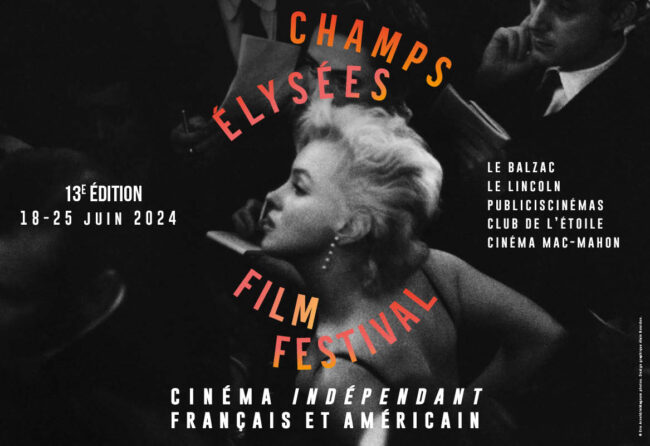Champs-Elysées: The Other French Film Festival
Cannes has the glamour and gets the headlines, but there’s another film festival about to begin in the French capital: the 13th Champs-Elysées Film Festival, dedicated to American and French independent cinema, will run from June 18 to 25, 2024. At the very least the festival offers a diverse array of offbeat talent and subjects. At its best, it may just introduce some future major filmmakers, depending not only on talent but on the luck to click with whatever zeitgeist is currently lurking.
Films will be screened at the cinemas of the Champs-Elysées, the avenue the French (and many others) call the “most beautiful avenue in the world”, but which in recent years has become a grittier district of movie theaters. These include first-run and chain theaters like Publicis Cinémas, UGC Normandie, Gaumont Champs-Elysées, as well as artier and smaller cinemas like Le Balzac and Le Lincoln. More recently economic pressures have impacted theaters: the Normandie is now shuttered. (The Gaumont Marignan closed at the end of 2023.) The irony is that as more tourists and shoppers frequent the Champs, rents have skyrocketed. This while ticket prices have risen for consumers who have recourse to alternatives like Netflix and other streaming services.
Setting itself apart from the exclusivity of that other festival, the Champs-Elysées Film Festival aims to make itself accessible to a broad public. 69 euros — 39 euros for persons under 26 — buys access to all events, though on a first come, first served basis. These include general screenings, sneak previews, opening and closing ceremonies, and even “rooftop showcases and DJ sets”. There are less expensive weekend passes, packages for the opening ceremony, as well as tickets for specific screenings. Tickets and passes can be purchased online here.
The inaugural screening is dedicated to the theme of “primitives” and will feature Sasquatch Sunset. The festival features three “guests of honor”: Vincent Delerm, Elisabeth Subrin, and the collective (LA)HORDE. Delerm’s work straddles music, the visual arts and film. As a singer he’s released several albums, and has composed the soundtracks of four films. He’s also a noted photographer whose work has been shown in numerous exhibits. He’s been directing films since 2019’s Je ne sais pas si tout le monde est là. His latest film Le Cœur qui Bat (literally The Beating Heart), like his first feature a documentary, explores relationships and emotions. (It’s completely booked except for pass-holders.)
Elisabeth Subrin has gained acclaim as an experimental filmmaker and creator of video installations. She’s established in the U.S., where her work has been shown at MOMA and Lincoln Center. Her first French narrative movie Maria Schneider, 1983 was featured in Cannes and won a César award. She’s currently living in New York and teaches at Temple University. In addition to having several of her films shown, Ms. Subrin will be presenting a master class on June 22.

The group known as (LA)HORDE has worked under the auspices of the CCN Ballet National of Marseille since 2019. Its members, Marine Brutti, Jonathan Debouwer, and Arthur Harel, have created films, performance pieces, and choreographic creations that have explored dance’s political dimension in various genres. Several of their films will be shown, mostly shorts, but also the feature Mister Lonely. They will also take part in a “conversation” on Music, dance and cinema (June 21).
Sneak previews include French features Château Rouge (directed by Hélène Milano), Comme le feu (Philippe Lesage), Il était une fois Michel Legrand (a documentary about the great movie composer, directed by David Hertzog Dessites), L’enfant qui mesurait le monde (Takis Candilis), Le Coeur qui Bat (Vincent Delerm), Les Reines du drame (Alexis Langlois). The celebrated director Michel Gondry is presenting his animated feature Maya, donne-moi un titre.
According to the festival’s organizers, the American filmmakers featured this year have in common the need to navigate a “chaotic world, searching for community in a new society by way of 90s-style popular culture and the exploration of new media and tools to communicate.” Features from the U.S. include Didi (Sean Wang), Between the Temples (Nathan Silver), Good One (India Donaldson), I Saw The TV Glow (Jane Shoenbrun), It Doesn’t Matter (Josh Mond), and The Dells (Nellie Kluz).
In addition there are six French features, as well as short and mid-length films by both American and French filmmakers. This year the festival is also reaching out to Canada, America’s northern neighbor and France’s linguistic sister country. The program Les Heures (Happy House) will showcase several Canadian and Quebecker independent films, including Solo (Sophie Dupuis), Les rayons gamma (Henry Bernadet).
A program for children includes, aside from Michel Gondry’s Maya, Beurk (for age 6 and up), directed by Loïc Espuche, Filante (age 3 and up) directed by Marion Jamault, L’Ourse et l’Oiseau (age 6 and up) directed by Marie Caudry. On Wednesday June 19 there will also be an afternoon of short films for children courtesy of Miyu Distribution.
If you’re a Grinch who finds kiddie cinema cloying, you’ll be entertained by the festival’s marquee theme this year: Les Tueuses (my translation: Murder Grrrrlz). Featured is a panoply of films about female killers, the idea being that this is but a metaphor for personal liberation and doing the patriarchy. There will be a roundtable discussion dedicated to Buffy, the Vampire Killer, with a panel including the director and screenwriter. Screenings include killer klassics like The Brood (by David Cronenberg), Heathers (by Michael Lehmann), André Zulawski’s Possession (featuring Isabel Adjani), Tony Scott’s tony vampire film The Hunger. There are a slew (no pun intended) of lesser known films on the same theme, including the intriguing Icelandic film The Juniper Tree, directed by Nietzchka Keene (who if nothing else deserves a prize for best filmmaker first name in the history of cinema). Aside from the features is a short, Filles Bleues, Peur Blanche, by Marie Picoty, a much-exhibited French artist living in London.
Complete program information about screenings and other events can be found at the festival site: www.champselyseesfilmfestival.com/2024.
Lead photo credit : View of the Avenue des Champs-Élysées from the Place de la Concorde. Photo credit: dronepicr / Wikimedia commons
More in Champs-Élysées




